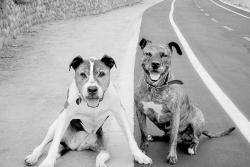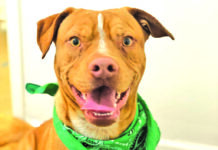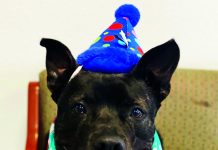When you have an animal, you know that old age, ailments and dealing with their death is inevitable. When you adopt a senior dog, like Sunny, you know it’s probably going to happen sooner rather than later.
That has always been my reason for not adopting an older dog. I always felt my heart couldn’t take it. All that changed when I met Sunny.
She was abandoned at the shelter at age 16. She had a tumor on her leg and her eyes were inflamed, red and swollen. She looked like she was at death’s door.
When I learned her family took her there, I knew I couldn’t let her die alone. And so I took her home with the intention of giving her a few good days, toys, treats and a lot of love. I didn’t think she would last more than a few weeks.
That was in June. Sunny flourished in our home. It was like she was reborn. Her eyes got better. The tumor stopped growing. She played with her toys. Took long happy walks with Gabby. She even started liking the cats. Her 16-year-old body got a second wind.
On Friday, my husband and I came home from a dinner date. Both the dogs were asleep on the couch. As we entered the house, the familiar routine ensued.
Gabby jumped down and started dancing around our feet in a warm greeting. Sunny made her slow descent off the couch as well. It’s her version of a jump—front feet plop on the ground and then she slides her back legs off.
Only this time something terrible happened. She fell. The thud was horrible. And then she started to convulse. Her poor body twitching and arching on the ground.
I don’t know how I kept my wits, but I told Darrell to take Gabby for a walk. I grabbed Sunny and pulled her close. The seizure stopped. But my poor girl couldn’t move. Her eyes were darting back and forth and her head was in a sideways tilt.
I immediately called my veterinarian, Dr. Dean Gebroe. Of course the office was closed—it was 9 p.m. on a Friday night. I left a message and just held Sunny.
I didn’t know what to do. I was sure she had a stroke. Or was dying. I cried and stroked her head. I felt so helpless.
It was a very long night. Sunny didn’t seem to be in pain and she eventually fell asleep. The urgency seemed to have passed. And so I stayed up and watched her. Just in case anything else happened.
The next morning, I took her the doctor.
It turns out she had a vestibular episode. The vestibular system is what keeps the head and body oriented with gravity. It includes sensors in the inner ear that provide a sense of balance and equilibrium.
During a vestibular event, the brain is unable to recognize the information from the inner ear and the result is much like vertigo or being drunk with the spins.
“Vestibular disease typically affects larger dogs who are 12-14 years old. The causes are unknown in most cases, but can rarely be caused by ear infections, tumors, cancer in the ear or brain tumors,” according to the American Veterinary Medical Association.
“Symptoms come on very suddenly and are drastic and frightening to witness. Dogs can stagger and stumble, roll, have head tilt, eyes that dart or roll, have facial paralysis, head tremor, and body weakness.”
The good news is that generally in a few days symptoms improve. By the time 2 weeks pass, most dogs are almost as good as new. Typically all that lingers is the head tilt.
Sunny has improved tremendously in the last 3 days. She is eating and drinking. She is holding herself up and walking with only a little help from us. This morning she even tried to get up on the couch. Her fighting spirit has returned. And thank God. I wasn’t prepared to let her go just yet. And it seems, she isn’t ready to go either.
Things to do if your dog has a vestibular event:
Keep your dog still. The most dangerous part of this illness is the potential injury your dog could suffer from falling. They really don’t have control and should not be left to navigate on their own. If possible leash, crate or pen your dog.
Keep things calm and quiet and provide moral support. Dogs don’t understand why their world is suddenly turned literally upside down from their perspective and will need reassurance. Don’t get upset because dogs can read that and will get more worried.
Hand feed and water your dog. They can be very nauseous and may not want to eat. If they refuse even food you would eat yourself, you may have to take them to the vet to get an IV.
Irresistible food. Chicken and rice, baby food, or a bland canned food. Normal treats will probably not suffice.
A sling or harness. This is particularly important with a big dog. Get a dog harness or carrier.
Leave a light on. This helps them keep their bearings.
Be prepared to provide 24-7 care for at least 48 hours. Make arrangements for what you would do if your dog nee













